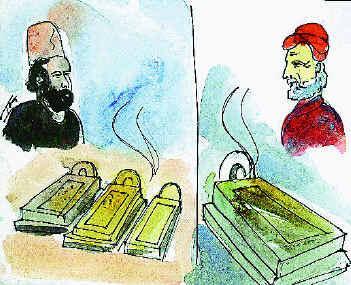WHILE THE last resting place of Sheikh Ibrahim Zauq in Paharganj has been restored some respectability, thanks to the Supreme Court’s intervention, the graves of Khwaja Mir Dard and Hakim Momin Khan Momin behind the Maulana Azad Medical College are still a picture of neglect. It’s high time something was done to save them.
Mir Dard Road leads to the grave of the great Urdu poet, but the land surrounding it has been sold by the unscrupulous, and palatial buildings have come up around it, leaving only a small plot for the mazar. The grave of Momin is within a boundary wall, along with the graves of Shah Walliullah, the saint whom the poet held in high reverence, and members of the Shah’s family.
Over 40 years ago the hilly land near the grave was bulldozed and plans made to do away with the mazars. A great lover of Momin, Sher Ali Mewati heard of this and came from Mewat (Haryana) to save them. It is said that he lay on the road in front of Teen Murti House and did not get up even when Pandit Nehru was being driven out in his car.
Nehru got down from the vehicle and enquired what the matter was. When Sher Ali told him that the graves of Shah Walliullah and Momin were about to be bulldozed, the Prime Minister got very upset and drove to the spot. The demolition was immediately halted, and later Sher Ali Mewati was able to get the mazars repaired and enclosed in a boundary wall.
The area where this kabristan is situated is known as Mehdian. Sher Ali Mewati, they say, actually lay before a bulldozer to stop the demolition and his leg was fractured in the process. Whatever may be the truth, the area needs another man like him to preserve it from encroachment.
Khwaja Mir Dard was born in 1719 in Delhi and died on January 7, 1785. “Mysticism ran in the family, for he was descended on his father’s side from Khwaja Baha-ud-Din Naqshbandi, and on the mother’s side from Hazrat Ghaus-e-Azam,” says Professor Muhammad Sadiq.”Dard studied theology with his father, and learnt the art of poetry from Khan-e-Arzu. For some time he was in the army, but he gave it up to lead a life of retirement and study and, at 39, on his father’s death, succeeded him as the head of a sanctuary.”
The vanity and unreality of life and its joys and sorrows, unity of existence, the greatness of man in the hierarchy of life, the mirage of the intellect, praise of intuition, the extinction of self and suspicion of worldly life, pietism, contentment, resignation – nearly one third of his poetry is devoted to these ideas.
Professor Sadiq says that Momin Sadiq’s ancestors had migrated from Kashmir to Delhi. “His father, Hakim Ghulam Nabi, was a physician of note and connected with the imperial court. Momin was born in 1800 and was given that name at the instance of his father’s spiritual guide, Shah `Abdul’ Aziz. His education had been thorough and systematic, as is proved by the embarrassing profusion of technical terms pertaining to medicine, astronomy, mathematics, music, etc., in his qasidas. A man of pleasure in his youth, he forswore his Bohemian ways when he became a disciple of Sayyid Ahmed of Rae Bareily, but he was far too human to sink into a dour puritan. The fruits of his conversion can be studied in his Masnavi-e-Jahadiyya and a few other pieces. He died in 1851.”
Momin is said to have predicted his death in verse, as he was also a najoomi (astronomer-cum-astrologer), saying he would end up with broken arms and legs (“dast-o-bazu”). This is actually what happened years later when he fell from a ladder and died after nine days. His famous couplet, “Tum mere pas hote ho goya/ Jab doosra aur koi nahin hota” made his contemporary Ghalib remark that Momin could take his entire dewan and give him just this pearl of a couplet in exchange.
Momin’s best work is Ab-e-Hayat (Parnassus literally, but water of paradise figuratively) Shouldn’t his grave and that of the great Mir Dard be preserved?
source: http://www.hindu.com / The Hindu – Online Edition / Home> Features> Magazine / Down Memory Lane by R V Smith / Monday – May 24th, 2004










